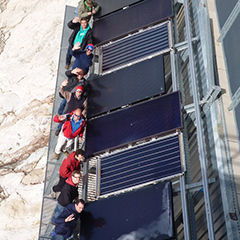In the collaborative project “SpeedColl,” sponsored by the German Federal Ministry of Economic Affairs and Energy (BMWi) and its various industry partners, solar collectors and components were exposed to weathering and continuously monitored. Products from renowned German solar collector manufacturers and suppliers are installed on the Zugspitze, Germany’s highest mountain, as well as on Gran Canaria, in the Negev Desert and India. Their degradation behavior and monitored performance provides important information about the aging effects of different climate zones. Load and material data gathered at the sites help to develop suitable aging tests, which in turn support collector development for the domestic and export markets. The latest results will be presented at the final project presentation and panel discussion on November 2, 2015 at the Fraunhofer-Forum in Berlin. Participation is free of charge, however, registration is requested.
The most important results on climate data and component parameters in maritime, arid, alpine, tropic and moderate climate zones will be presented to the attendees at the event. Especially the areas of corrosion and moisture absorption in the collector will be addressed. The effects of these and other aging factors will be explained in detail. A further focus is on implementing the acquired measurement data in test cycles to simulate real life conditions. Cyclic testing of the products is essential for guaranteeing the reliable and long-term operation in various climates. “The “SpeedColl” project is an important first step towards making realistic durability estimates of solar thermal system components. It also helps to customize the products for expanding markets, for example, where strong solar radiation and high hot water or heating demands exist,” says Karl-Anders Weiß, project leader and group leader of Service Life Analysis at Fraunhofer ISE.
The great enthusiasm of the German solar thermal sector demonstrates just how important this topic is to the field. Not only does the sector contribute financially but they also actively participate in the organization of this project. The acquired data is evaluated together with industry partners and is used to further develop this project. The demands of the industry sectors involved are therefore covered 1:1. From this angle, the industry partners will also organize the concluding panel discussion on November 2 in Berlin. They will also be presenting their individual project results. “SpeedColl is not only about accelerated aging tests, but also about the strong cooperation between German collector and component manufacturers, who are confronting the challenges of today’s solar thermal market together,” summarizes Ralf Köbbemann-Rengers from Bosch, project partner and speaker of the German Association for Efficiency and Renewable Energies (BDH) in the German Solar Thermal Technology Platform (DSTTP).


























